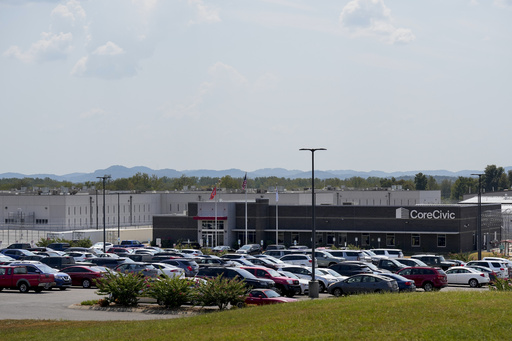
NASHVILLE, Tenn. — A prominent private prison organization in the United States has disbursed over $4.4 million to resolve numerous complaints concerning inmate mistreatment, which includes at least 22 deaths, across its facilities in Tennessee since 2016.
One of the most significant settlements, exceeding $1.1 million, was related to Tennessee’s largest prison, the Trousdale Turner Correctional Center, which is currently under federal scrutiny due to ongoing concerns.
Information regarding nearly 80 settlements was revealed through public records requests, indicating allegations of severe abuse, neglect, and violence within CoreCivic’s four prisons and two jails located in Tennessee. Among these incidents was a distressing case in which an inmate at Trousdale murdered his cellmate, Terry Childress, in a desperate effort to escape the facility. Reports allege that staff failed to provide assistance to Childress within the understaffed environment, leading to a $135,000 settlement for his family.
Attorney Daniel Horwitz, representing Childress’ family, has faced a court order to refrain from publicly criticizing CoreCivic and to remove previous disparaging statements he made on social media. He is now challenging the gag order in court.
Recently, the U.S. Department of Justice initiated an investigation into Trousdale, prompted by ongoing reports of violence that have plagued the facility since it opened in 2016. According to U.S. Attorney Henry Leventis, there have been extensive and well-documented claims of physical assaults, sexual violence, homicides, and significant staffing deficiencies at the prison.
Mary Price, legal counsel for Families Against Mandatory Minimums, criticized CoreCivic’s pattern of settling lawsuits, emphasizing that these financial resolutions appear to be a standard operational cost rather than an indication of urgency or major concern.
Headquartered in Brentwood, Tennessee, CoreCivic’s value is estimated at $1.44 billion based on market capitalization, yet many affected inmates and families have endured protracted battles for even modest settlements. Some have advocated publicly for justice, often sharing their stories through media channels, but typically settling cases required them to remain silent. Typically, CoreCivic has refrained from admitting any guilt in these settlements.
The largest settlement reached $900,000 following a suicide case involving an inmate at the South Central Correctional Facility, where staff was accused of falsifying documentation. While three other settlements were around $300,000, many settlements were for significantly smaller amounts, with half being $12,500 or less and some yielding no financial compensation.
Ashley Dixon, a former corrections officer at Trousdale, noted that victims often face the distressing choice between accepting a settlement and losing the opportunity to share their experiences, which could help prevent further incidents.
In response to queries, CoreCivic spokesperson Ryan Gustin declined to comment on individual settlements, citing confidentiality provisions. He pointed out that staffing issues are widespread across the corrections sector and claimed that CoreCivic has implemented various hiring incentives to address personnel shortages. Gustin further asserted that their facilities provide comprehensive medical and mental health care and are subject to rigorous state monitoring.
The settlements represent only a small fraction of the countless lawsuits faced by CoreCivic in Tennessee. The 22 settlements related to deaths are merely a portion of the 300-plus fatalities that have occurred in their prisons since 2016. A significant number of these deaths were attributed to natural causes, including that of Jonathan Salada, who suffered from untreated diabetes and ultimately died after being left unmonitored for days. His family received a $50,000 settlement.
Reports from settled lawsuits describe alarming instances where essential staff positions were unfilled, allowing inmates to remain defenseless against assaults. Adrian Delk, who suffered severe injuries after being attacked by gang members at Hardeman prison, was awarded a $120,000 settlement for the violent assault that lasted nearly an hour without intervention.
Prison staff members are also victims of violence, as demonstrated by an incident at Trousdale in 2019 where a counselor was severely injured during an attack by an inmate. A state auditor reported that corrections officers feel a continuous sense of danger while working in these facilities.
Despite an awareness of the troubling conditions at CoreCivic, the state has persistently minimized these issues and continued to renew contracts with the company, which heavily influences political expenditures. CoreCivic has emerged as Tennessee’s largest state contractor, constituting 10% of its overall revenue.
Republican Governor Bill Lee has publicly stated the importance of CoreCivic as a partner to the state despite the ongoing controversies. In a legislative hearing, when Dixon attempted to share significant oversight issues related to inmate deaths, a committee chairman attempted to curtail her testimony, drawing bipartisan concern and applause when a Democratic representative questioned the limits placed on her.
The cases highlight severe deficiencies in medical care, with many inmates being denied crucial medication and treatment—leading to grim outcomes such as deaths from untreated illnesses, self-harm, and chronic health issues. For instance, Belinda Cockrill’s fight for justice for her daughter, who died from a treatable form of cancer due to delayed medical intervention, culminated in a $45,000 settlement.
Furthermore, Kathy Spurgeon did not pursue legal action following her son Adam’s death, which occurred while recovering from heart surgery in Trousdale, citing fears for her surviving son’s safety amidst threats from prison gangs. Her story underscores the pervasive climate of fear and the challenges families face when seeking accountability from such institutions.

